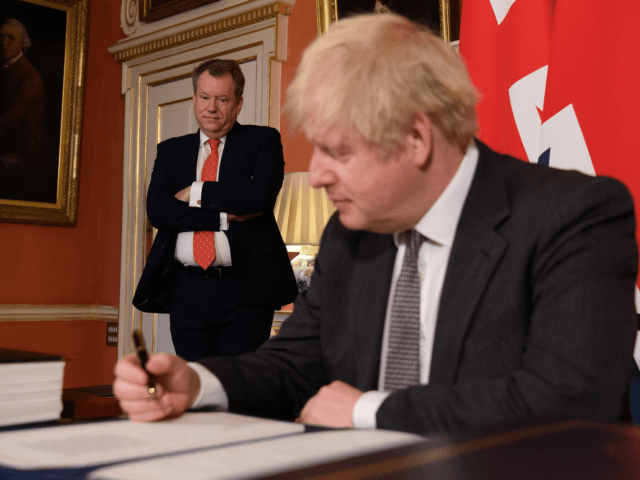The British government has proposed an “entirely new” arrangement for trade with the EU in Northern Ireland, admitting that the agreement reached Boris Johnson is “not working”.
In a speech in Lisbon, Portugal on Tuesday, the United Kingdom’s Brexit Minister, Lord David Frost, accused Brussels of threatening the peace established in the Good Friday Agreement through how it has implemented the Northern Ireland Protocol.
The agreement has seen the establishment of border checks on goods between Great Britain and Northern Ireland, also known as Ulster, which is an integral part of the United Kingdom. The disruption caused to internal trade within the UK has seen rising tensions in Northern Ireland, including violent protests amid food shortages.
In his speech on Tuesday, Lord Frost declared that the Protocol was “the biggest source of mistrust” between Britain and Brussels and that the border checks have “completely lost consent in one community in Northern Ireland” — namely the pro-British unionist majority.
Shifting blame for the agreement which he helped craft at the behest of Prime Minister Boris Johnson, Lord Frost continued: “There is a widespread feeling in the UK that the EU did try to use Northern Ireland to encourage UK political forces to reverse the referendum result or at least to keep us closely aligned with the EU, and, moreover, that the Protocol represents a moment of EU overreach when the UK’s negotiating hand was tied, and therefore cannot reasonably last in its current form.”
The Brexit Minister said that the agreement could have worked if the European Union chose to implement it “more sensitively… But the situation has now moved on. We now face a very serious situation. The Protocol is not working.”
Therefore, Lord Frost said that he sent an “entirely new” legal framework for the Northern Ireland Protocol to the European Commission on Tuesday.
The new legal text would remove another humiliating concession which the Tory government previously agreed to, namely, the jurisdiction of the European Court of Justice (ECJ) over the Protocol, which effectively has kept EU law in place in the British province after Brexit.
It is unlikely that the bloc will accept such an offer, with European Commission Vice-President Maros Šefčovič expected to roll out a counteroffer of smaller tweaks to the agreement on Wednesday.
The Slovakian politician is expected to offer reduced checks on some goods and medicines and will allow the sale of chilled meats from Great Britain into Northern Ireland, which previously faced restrictions in what was dubbed the ‘Sausage Wars’.
Šefčovič said, according to the BBC, that the new proposals would be “very far-reaching” and would greatly reduce border checks on agrifoods (agriculture, horticulture, and food and drink processing products). Crucially, however, EU law would still be maintained in Ulster, leaving any potential deal up to the same criticism from the province’s pro-unionist population that it has damaged Northern Ireland’s place in the United Kingdom.
If the two sides fail to come to an agreement, the British could trigger Article 16, an emergency provision to suspend the Brexit divorce agreement. Should Britain enact the clause, it would be likely that the EU would try to impose tariffs on British goods, kicking off a defacto trade war.
Lord Frost said that that he hopes the EU is ready to make “significant change” to the Protocol, saying: “We need the EU to show the same ambition and willingness — to tackle the fundamental issues at the heart of the Protocol head-on.”
Follow Kurt Zindulka on Twitter here @KurtZindulka

COMMENTS
Please let us know if you're having issues with commenting.